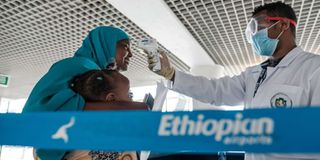Premium
As Covid starts to surge, Ethiopia battles complacency

A worker of the Ethiopian Public Health Institute (EPHI) measures a passenger's temperature at a control point at Bole International Airport, in Addis Ababa on on March 17, 2020 .
What you need to know:
- Officials worry a lax approach could hobble Ethiopia's pandemic response just as the surge in cases they have been warning about for months finally arrives.
- To date, Ethiopia has recorded just over 16,600 infections and 260 deaths -- modest figures given its population of 110 million.
- To officials' dismay, the upward spiral is coinciding with mounting signs of virus fatigue.
The car paused at a traffic light, its rooftop megaphone pumping out a message that the city government of Addis Ababa has been hammering for months.
"Yes, we can and you can!" the recording began.
It then ticked off basic coronavirus prevention, such as hand-washing, physical distancing and avoiding the handshake-plus-shoulder-bump greeting that is normally a fixture of street life in the Ethiopian capital.
But the message was drowned out by the din of rush hour and seemed barely to register with customers crammed around tables in roadside cafes.
Inside the car, the health workers themselves questioned what effect they were having.
"We teach people to apply these precautions, but some people put their masks in their pocket and wear it only when our teams are around," said Wondimu Taye, a city health communications officer.
Officials worry this lax approach could hobble Ethiopia's pandemic response just as the surge in cases they have been warning about for months finally arrives.
To date, Ethiopia has recorded just over 16,600 infections and 260 deaths -- modest figures given its population of 110 million.
Yet the numbers have been trending sharply upward and have doubled in less than three weeks -- and the World Health Organization (WHO) frets that unrest sparked by the killing of a pop star from the Oromo ethnic group could further accelerate transmission.
To officials' dismay, the upward spiral is coinciding with mounting signs of virus fatigue.
Once-ubiquitous hand-washing stations are becoming scarcer. Once-empty restaurants are filling up. And even some health workers say they are struggling to maintain the same vigilance they had in March.
"People's fear about Covid-19 has been eroding over time," Benyam Worku, an assistant professor at Addis Ababa University's School of Medicine, told AFP.
"But it doesn't seem likely that we have escaped Covid-19. Most probably it has been a long wait, and now the wait is over."
A PROMISING START
Africa's second most populous country earned high marks early on in the pandemic.
At the international airport in Addis Ababa, which has remained open, officials used temperature checks and quarantine policies to slow Covid-19's arrival.
After the first case was confirmed in mid-March, the government closed land borders and schools, freed thousands of prisoners to ease overcrowding, introduced compulsory mask-wearing and discouraged large gatherings.
Prime Minister Abiy Ahmed also declared a state of emergency in early April, though he stopped short of imposing a lockdown out of concern for those who must "make ends meet daily".
Despite those measures, community transmission was in full swing well before the shooting death in late June of Hachalu Hundessa, a politically active pop star who was a hero to many Oromos, Ethiopia's largest ethnic group.
Hachalu's murder kicked off days of protests and inter-ethnic attacks in Addis Ababa and the surrounding Oromia region, temporarily overshadowing the pandemic for many Ethiopians.
This unrest hindered health officials' work during a critical period and may be partly to blame for rising cases, said Dr Boureima Hama Sambo, the WHO's Ethiopia representative.
"We've seen mass gatherings with little or no protective measures in a context of already established community transmission," Boureima said.
"One is to expect a spike in numbers."
WE WILL ALL BE FINE
Around three-quarters of all Covid-19 cases in Ethiopia are in Addis Ababa.
The hardest-hit district of the city is Addis Ketema, home to Mercato, a jam-packed collection of shops and stalls that is sometimes described as Africa's largest open-air market.
Many thousands flock to Mercato every day, which is why officials worry clusters there could drive up numbers across Addis Ababa and beyond.
"The lifestyle of the people in this area depends on mobility," said Mola Teshome Ambaye, a nurse who does house calls and temperature checks for the city in Mercato.
Standing on a cobblestone road near stalls selling construction materials, Mercato resident Biruk Awoke told AFP that concern about the virus had plummeted recently.
"Before the first case people were horrified. A lot of people closed their shops down and used to stay at their homes," he said. "But now people have gotten more used to the prevention methods."
He noted that he, too, was less worried about the virus, pointing to the 6,000 people in Ethiopia who have recovered.
"I even had two brothers who had Covid-19, we used to eat together and do everything else together," he said.
"But they were the only ones who got sick and they recovered, so now I think we will be fine."
BECOMING NEGLIGENT
This type of thinking alarms doctors and nurses at St Peter's Specialized Hospital, which has treated 245 Covid-19 patients since March.
Driving into work each day, nurse Addisu Adane shakes his head at crowds packed tightly outside churches and at bus stops.
"It's no different than before," he said.
Yet Addisu acknowledged that even he and his colleagues have become more relaxed about wearing masks and maintaining distance when they're outside the hospital.
"We know the virus is a killer. We know it's bad," he said. "But we are still becoming negligent."
Hama Sambo, the WHO representative, stressed that prevention measures will only become more important as community transmission becomes more sustained.
"Sometimes people may think that it happens only to others," he said.





